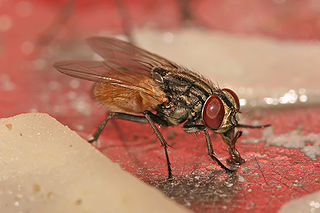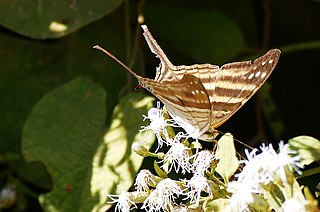
Convolvulaceae, known commonly as the bindweed or morning glory family, is a family of about 60 genera and more than 1,650 species of mostly herbaceous vines, but also trees, shrubs and herbs, and also including the sweet potato and a few other food tubers.

Tilapia is the common name for nearly a hundred species of cichlid fish from the coelotilapine, coptodonine, heterotilapine, oreochromine, pelmatolapiine, and tilapiine tribes, with the economically most important species placed in the Coptodonini and Oreochromini. Tilapia are mainly freshwater fish inhabiting shallow streams, ponds, rivers, and lakes, and less commonly found living in brackish water. Historically, they have been of major importance in artisanal fishing in Africa, and they are of increasing importance in aquaculture and aquaponics. Tilapia can become a problematic invasive species in new warm-water habitats such as Australia, whether deliberately or accidentally introduced, but generally not in temperate climates due to their inability to survive in cold water.

Plantaginaceae, the plantain family, is a family of flowering plants in the order Lamiales. In older classifications it used to be the only family of the order Plantaginales, but numerous phylogenetic studies, summarized by the Angiosperm Phylogeny Group, have demonstrated that this taxon should be included within Lamiales.

Nyctaginaceae, the four o'clock family, is a family of around 33 genera and 290 species of flowering plants, widely distributed in tropical and subtropical regions, with a few representatives in temperate regions. The family has a unique fruit type, called an "anthocarp", and many genera have extremely large pollen grains.

Muscidae are a family of flies found in the superfamily Muscoidea.

Lycaena editha, known generally as the Edith's copper or great gray copper, is a species of copper in the butterfly family Lycaenidae. It is found in North America.
Milesia scutellata is a species of syrphid fly in the family Syrphidae.
Mixogaster breviventris is a species of syrphid fly in the family Syrphidae.

Proteides mercurius, the mercurial skipper, is a species of dicot skipper in the butterfly family Hesperiidae. It is found in the Caribbean Sea, Central America, North America, and South America.

Marpesia chiron, the many-banded daggerwing, is a species of daggerwings, map butterflies in the family Nymphalidae. It is found in Central America, North America, and South America.
Chrysotoxum chinook is a species of syrphid fly in the family Syrphidae.

Stilobezzia is a genus of predaceous midges in the family Ceratopogonidae. There are more than 330 described species in Stilobezzia.
Aradus funestus is a species of flat bug in the family Aradidae. It is found in North America.
Aradus depictus is a species of flat bug in the family Aradidae. It is found in North America.
Lispoides is a genus of house flies, etc. in the family Muscidae. There are about 17 described species in Lispoides.

Electrostrymon angelia, the fulvous hairstreak, is a species of hairstreak in the butterfly family Lycaenidae. It is found in North America.
Sphecomyia nasica is a species of syrphid fly in the family Syrphidae.

Ceroplastes is a genus of wax scales in the family Coccidae. There are more than 130 described species in Ceroplastes.
Spilomyia liturata is a species of syrphid fly in the family Syrphidae.
Animal Ethics is a nonprofit organization formed to promote discussion and debate around issues in animal ethics and to provide information and resources for animal advocates. They also do outreach work in several countries on the issue of speciesism. Their aim is to create a world where moral consideration is extended to all sentient beings. The organization's website covers topics such as speciesism, sentience, veganism and wild animal suffering and has content translated into several languages.










